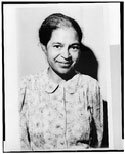Parks' Death Should Shake Us from Our Comfort Zone
When I read that Rosa Parks had died, I began to think about how hard black people like Parks fought to ensure that blacks were given their civil rights. I thought about how, back then, it meant something to be black. It meant you were proactive, hardworking and dedicated to the struggle. I thought about how today many of us take all of those things for granted. From my own observations, it seems that blacks today are apathetic; not just about civil rights but about nearly everything. It seems as though we as a people have become complacent. It’s almost as if we have established a comfort zone and we are fine with where we are. I am not. Neither were Harriet Tubman, W.E.B. DuBois, Malcolm X, Martin Luther King Jr. or Rosa Parks, just to name a few. I couldn’t help but think, what if those people had been fine with where they were? What if they, too, had been apathetic and complacent? Would we still be out in fields pricking our fingers as the sun beamed down on our backs while we picked the white man’s cotton? We would still be considered three-fifths of a citizen. We would still be owned as property -- bought, sold and traded on the slave market. We would still be unable to vote; to voice our concerns and elect our leaders. I have often wondered why we are not as proactive as our ancestors. Why can’t we choose to work for one another rather than against each other? I’ve wondered why we can’t unite, not even for our own sakes.
Rosa Parks was one person. That one person, physically tired from work and mentally tired from racial injustice, birthed a movement. That one person helped make Thomas Jefferson’s words, “We hold these truths to be self-evident, that all men are created equal,” apply to the black race. That one person inspired blacks from all over the country to stand up and say, “Enough is enough.” Why then can’t we, as a people, stand up to the ethnocentric attitudes of white America? Why can’t we protest and demonstrate until there is more than just one black Supreme Court justice and more than one Cabinet member who happens to be black? Why, in spite of the efforts of our ancestors, do we still sit in the back of the buses and in the back of the classrooms? Why do we not vote and take an interest in the government and its policies? Why do we succumb to the stereotypes of which we have been accused? When will we stand up and take our place at the front? This country was built on the backs of black people. It was their hard labor, sweat, blood and tears that made the greatest contribution to the development of this country’s economy, yet we choose to stand behind the scenes and allow ourselves to be the silent minority. We still choose to be seen and not heard. Rosa Parks is gone, but enough of her legacy and the legacy of those before her should be in our hearts and minds to make us stand up, take a look and think long and hard at whether this is where we really want to be. I challenge every black woman and man, boy and girl, Christian and non-Christian, rich person and poor, to search deeply within and come to terms with who he or she is, what he or she represents, and what that means. From where I sit, there’s nothing more beautiful than black, and Sister Rosa, you have opened my eyes. Rest in peace, because what you have symbolized will never die. Posted Nov. 9, 2005 |
https://blackcollegewire.org/voices/051109_Minix/
|
Home | News | Sports | Culture | Voices | Images | Projects | About Us Copyright © 2006 Black College Wire. Black College Wire is a project of the Black College Communication Association and has partnerships with The National Association of Black Journalists and the Robert C. Maynard Institute for Journalism Education. |

